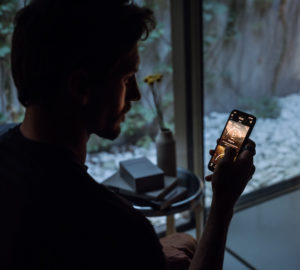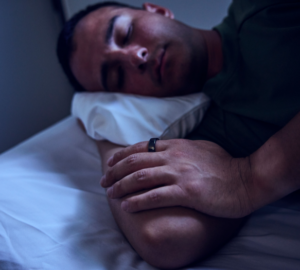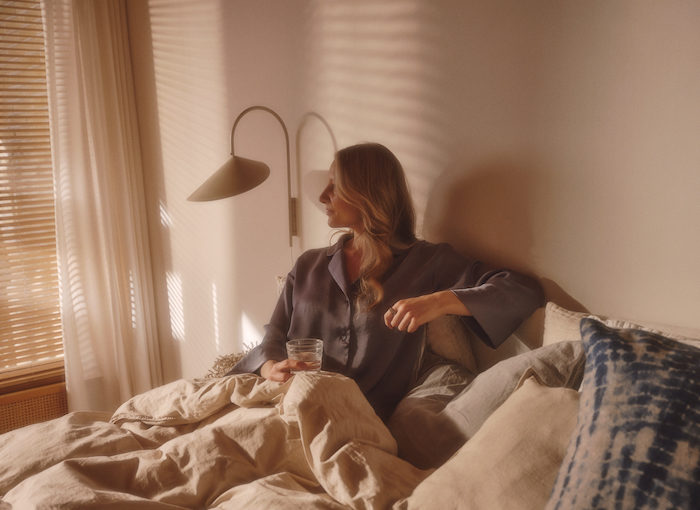No one sleeps optimally every night — and that’s okay! Sometimes, life gets in the way, whether it’s a social event, a noisy neighbor, or an addictive TV show.
While you can’t necessarily make up for lost sleep, the good news is that you can get back on track toward consistent, quality shuteye. One surefire way to help you sleep better is to improve your sleep hygiene — i.e., your habits, behaviors, and environment around bedtime.
Can You Improve Your Sleep Hygiene?
Yes! There are many science-backed ways to optimize your evening behaviors and environment — and fortunately, they’re all pretty straightforward.
You can think about sleep hygiene as a sort of “checklist” by the five senses: sight, sound, taste, touch, and smell. Below, find science-backed tips associated with each sense, all of which can help you get a better night’s sleep — tonight.
| Member Tip: Tag your evening behaviors and actions to learn how they impact your own quality of sleep over time. |
How to Improve Your Sleep Hygiene Tonight
1. SIGHT: Minimize sources of light.
Artificial light interferes with the production of melatonin, the sleep hormone. In fact, studies show it can suppress melatonin production by 50%. While blue light from electronics is the most villainous kind, any source of light — an LED clock, TV, even or a sliver of light peeking beneath the door — can impact your sleep.
Try this tonight:
- You’ve heard it before, but we’ll say it again: Put down the phone at least an hour before bed. If you must look at your screen, use a night mode filter on your smartphone, or install an app like F.lux on your computer.
- Invest in a pair of blue-light-blocking glasses, like those by Ra Optics, to minimize the light in your environment after dark.
- Consider wearing a sleep mask to block out any light coming through the windows or from ambient devices. Oura members who tagged “sleep mask” in the Oura App saw a 6% decrease in awake time, according to internal research.
- If light comes in through your windows, install blackout shades or wear a comfy sleep mask to block out the light.
- Swap your regular light bulbs for 45-watt natural-light bulbs to lower the total amount of wattage in your home.
2. SOUND: Use white noise.
It may sound counterintuitive, but adding some noise to your environment — the relaxing kind — can help you sleep better. You may have heard of white noise, which studies have shown can help people fall asleep faster. Recent research shows that pink noise can be just as effective, and sleeping with pink noise has been linked with improved memory, possibly as a result of its effect on memory-enhancing sleep.
Try this tonight:
- Buy a noise machine or download an app like White Noise Lite (iOS, Android) that emits a soft, static-like sound (like gentle ocean waves or quiet rainfall).
- Am air purifier or fan can do double duty, clearing harmful particles from the air and providing a soft, pink noise in the background.
LEARN MORE: How Sleeping Background Noise Can Impact Your Sleep Quality

3. SMELL: Clear the air.
Research has shown that certain respiratory irritants can make sleeping more difficult. Allergy triggers in household dust include the obvious mold, pollen, and pet dander.
Plus, these particles are very small and can fragment into even smaller bits that cover your bed and are stirred up by motion in sleep, which can cause them to float in the air for minutes or hours.
Try this tonight:
- Turn on the fan. A 2023 study found that increasing fan speed led to improvements in sleep quality, underlining the importance of air flow and circulation as you sleep.
- Consider investing in an air purifier, such as Molekule’s Air Pro or Air Mini, to reduce dust or other particles that may be floating in the air.
- Remove outdoor clothing before entering the bedroom to minimize pollen and other outdoor irritants.
- Wash your sheets and pillow cases frequently. Bonus tip: If you know you are allergic to dust mites, consider dust mite covers for your bed.
- Consider using a lavender or chamomile-scented diffuser or essential oil before bed — both of these scents have been broken to help calm the mind and body.
4. TOUCH: Cool it down.
Your body temperature naturally lowers to help it wind down for bed, so a cool atmosphere naturally induces a feeling of sleepiness. And once you are asleep, your body temperature continues to lower, so a cooler environment can be supportive of this process. Then, as you get closer to waking up, your body temperature increases, which provides a signal to your body to halt melatonin production.
Try this tonight:
- When it’s time for bed, turn down the thermostat to between 60 to 67 degrees Fahrenheit (15.6 to 19.4 degrees Celsius), ideally.
- Try taking a warm bath or shower before bed, which can prompt your body to cool itself down. (Here’s why that works.)
- Your body’s ability to thermoregulate itself during sleep isn’t only dependent on the air in the room; it also depends on your bedding materials. Make sure your mattress and sheets aren’t made of materials that hold in heat, and are instead cooling and breathable.
RELATED: How to Choose the Best Bedding for Better Sleep
5. TASTE: Choose sleep-friendly snacks.
…but not too close to bedtime! Late-night eating has been shown to impact sleep quality. And what you eat matters as well as when: Not all foods are created equal, and while some can detract from your shuteye, others can actually benefit your sleep.
Try this tonight:
- If you’re craving a bedtime snack, go for a combo of carbs and protein. Think: cheese and crackers, an apple and almond butter, or turkey and a slice of whole-grain bread. Dairy is a smart addition if you can tolerate it, since calcium helps the brain convert the amino acid tryptophan (found in many proteins) into melatonin.
- Stay away from spicy or garlicky foods before bed, which can cause sleep-disrupting digestive issues, as well as foods that are particularly high in fat.
- Avoid caffeine or alcohol — both of which are known sleep-disruptors.
- Sip a cup of decaf tea with calming ingredients, such as chamomile, lavender, passionflower, or valerian root. Plus, the relaxing ritual of simply making a cup of tea can serve as a reminder to your body that it’s time to wind down.




